Daily Vocabulary Words: List of Daily Used Words
Hi there. Welcome to this special section @ Wordpandit.
Our endeavour here is straightforward: highlighting important daily vocabulary words, you would encounter in The Hindu. This is your repository of commonly used words; essentially, we are posting a list of daily used words. Hence, this has significant practical application as it teaches you words that are commonly used in a leading publication such as The Hindu.
Visit the website daily to learn words from The Hindu.
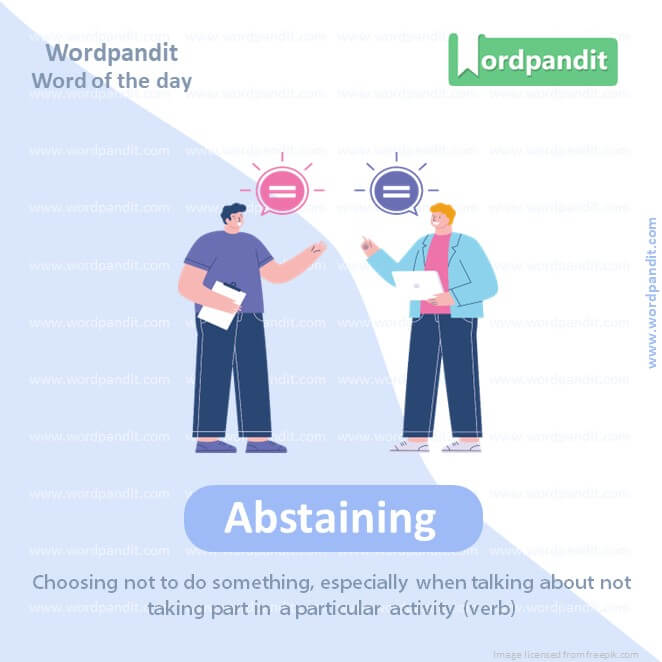
WORD-1: Abstaining
CONTEXT: Abstaining on a matter of global importance without making efforts to forge a consensus is out of sync with a desire to be the voice of the Global South, or for a seat at the global high table.
SOURCE: The Hindu
EXPLANATORY PARAGRAPH: Imagine you have a box of crayons and you want to color a picture. But you decide not to use the blue crayon today. That means you’re “abstaining” from using the blue crayon. It’s like choosing not to do something on purpose.
MEANING: Choosing not to do something, especially when talking about not taking part in a particular activity (verb).
PRONUNCIATION: ab-STAY-ning
SYNONYMS: Refraining, Forgoing, Withholding, Eschewing, Avoiding, Shunning, Skipping.
USAGE EXAMPLES:
1. She is abstaining from eating chocolates for a month.
2. Many members were present but abstained from voting.
3. John is abstaining from watching TV this week.
4. They are abstaining from coffee during the fast.
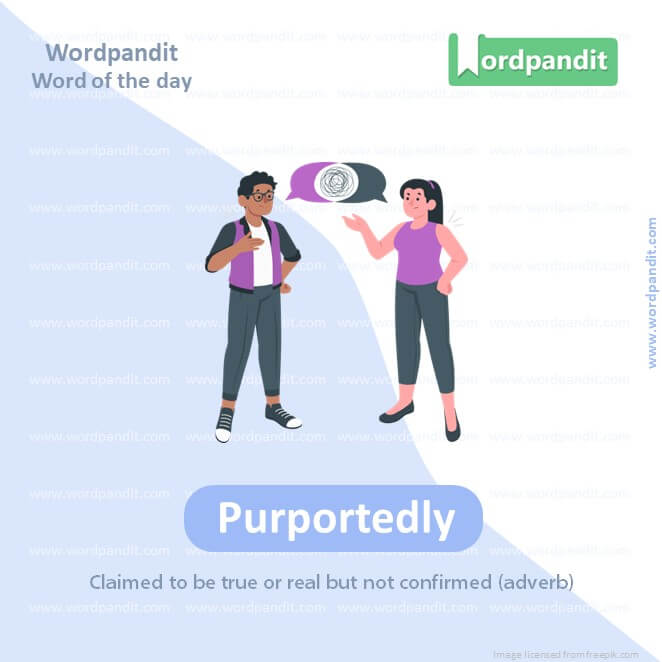
WORD-2: Purportedly
CONTEXT: The group also set ablaze a car parked at the residence of Solanke after an audio clip of the MLA, in which he purportedly spoke about the Maratha quota agitation.
SOURCE: The Hindu
EXPLANATORY PARAGRAPH: Imagine your friend told you they saw a unicorn in their backyard. They say it’s true, but you’re not sure. When you tell someone else, you can say, “My friend purportedly saw a unicorn.” That means your friend said they saw it, but we’re not 100% sure it happened.
MEANING: Claimed to be true or real but not confirmed (adverb).
PRONUNCIATION: pur-POR-ted-ly
SYNONYMS: Allegedly, Supposedly, Reportedly, Reputedly, Ostensibly, Professedly, Seemingly.
USAGE EXAMPLES:
1. She purportedly won the lottery but no one has seen the money.
2. The artist purportedly painted this masterpiece in just one day.
3. The cake was purportedly baked by a celebrity chef.
4. He purportedly traveled around the world in 80 days.
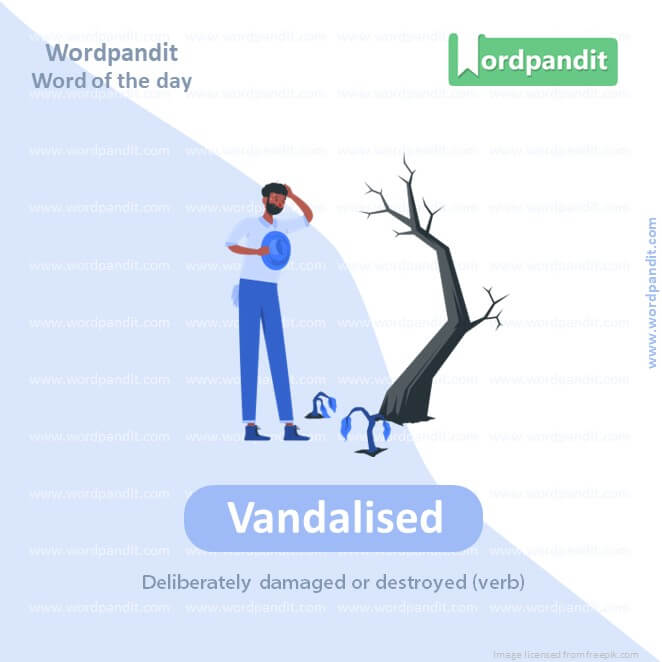
WORD-3: Vandalised
CONTEXT: the first floor of the Majalgaon Municipal Council building and vandalised it.
SOURCE: The Hindu
EXPLANATORY PARAGRAPH: Imagine someone took your drawing and scribbled all over it without permission. That’s not nice, right? When someone damages or destroys something on purpose, we say it’s been “vandalised”.
MEANING: Deliberately damaged or destroyed (verb).
PRONUNCIATION: VAN-duh-lized
SYNONYMS: Defaced, Damaged, Ruined, Destroyed, Desecrated, Marred, Tarnished.
USAGE EXAMPLES:
1. The park benches were vandalised by graffiti artists.
2. Someone vandalised the school’s mural overnight.
3. The statue in the town square was vandalised last week.
4. They vandalised his car by smashing the windows.
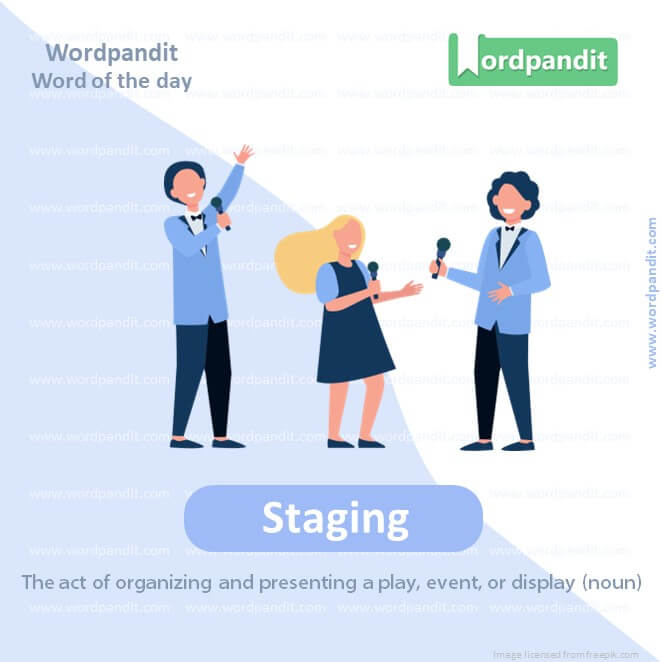
WORD-4: Staging
CONTEXT: Maratha community members have been staging protests in different parts of the State seeking reservation in government jobs and education under the OBC category.
SOURCE: The Hindu
EXPLANATORY PARAGRAPH: Think of putting on a play where you set up a scene, get actors, and prepare everything to tell a story. That whole setup and getting ready part is called “staging”.
MEANING: The act of organizing and presenting a play, event, or display (noun).
PRONUNCIATION: STAY-jing
SYNONYMS: Producing, Organizing, Arranging, Setting up, Mounting, Presenting, Displaying.
USAGE EXAMPLES:
1. The staging of the musical was excellent.
2. They are staging a protest downtown.
3. The staging area was set up for the marathon runners.
4. She was responsible for the staging of the art exhibit.
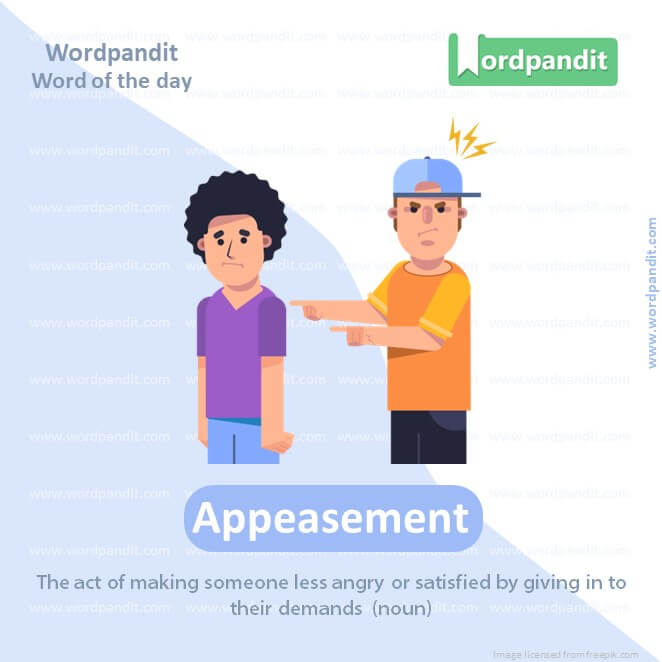
WORD-5: Appeasement
CONTEXT: Kerala was paying the price of “dirty shameless appeasement politics by a discredited Chief Minister.
SOURCE: The Hindu
EXPLANATORY PARAGRAPH: Imagine you have a little sibling who’s upset because they want candy. If you give them candy just to make them stop crying, that’s “appeasement”. It’s like trying to make someone happy or calm by giving them what they want.
MEANING: The act of making someone less angry or satisfied by giving in to their demands (noun).
PRONUNCIATION: uh-PEEZ-ment
SYNONYMS: Pacification, Placation, Conciliation, Satisfaction, Mollification, Propitiation, Soothing.
USAGE EXAMPLES:
1. The king’s appeasement of the rebels only led to more demands.
2. Giving candy to the child was an act of appeasement.
3. Appeasement is not always the best strategy in negotiations.
4. The government’s policies were seen as appeasement to the protesters.
WORD-6: Extremist
CONTEXT: The State allowed the former chief of the “extremist organisation Hamas.
SOURCE: The Hindu
EXPLANATORY PARAGRAPH: Imagine someone who really, REALLY loves ice cream, so much that they only eat ice cream for every meal and tell everyone else they should too. They have an “extreme” view about it. An “extremist” is someone who has very strong beliefs about something and might act very strongly because of those beliefs.
MEANING: A person who holds extreme views and may take radical actions (noun).
PRONUNCIATION: ek-STREE-mist
SYNONYMS: Radical, Zealot, Fanatic, Militant, Revolutionary, Hardliner, Ultra.
USAGE EXAMPLES:
1. The group was led by an extremist who wanted to change the entire system.
2. Authorities are concerned about the rise of extremist movements.
3. His views are considered extremist by many in the community.
4. The government is taking measures to combat extremist ideologies.
WORD-7: Frenzy
CONTEXT: what is more worrisome is the wave of speculation and communal frenzy.
SOURCE: The Hindu
EXPLANATORY PARAGRAPH: Imagine a big box of toys and lots of kids rushing to grab them all at once, shouting and laughing. It’s wild and crazy! That wild and excited activity is called a “frenzy”.
MEANING: A state of wild excitement or uncontrollable activity (noun).
PRONUNCIATION: FREN-zee
SYNONYMS: Hysteria, Furore, Uproar, Turmoil, Mania, Wildness, Tumult.
USAGE EXAMPLES:
1. The sale caused a frenzy among shoppers.
2. Fans were in a frenzy when the celebrity entered the room.
3. The news sent the stock market into a frenzy.
4. There was a frenzy of activity as the deadline approached.
WORD-8: Insinuations
CONTEXT: a minority community was kept on tenterhooks by communally charged social media posts loaded with insinuations and vile assertions of Kerala having become a den of jihadis.
SOURCE: The Hindu
EXPLANATORY PARAGRAPH: Imagine if someone hints or suggests something without saying it directly, like when a friend says, “Hmm, that cookie jar was full yesterday. I wonder where all the cookies went?” when they think you ate them. That hint or suggestion is called an “insinuation”.
MEANING: A hint, implication, or indirect suggestion about something (noun).
PRONUNCIATION: in-si-nyoo-AY-shuns
SYNONYMS: Implications, Intimations, Innuendos, Suggestions, Hints, Allusions, Undertones.
USAGE EXAMPLES:
1. Her insinuations about my honesty hurt my feelings.
2. He made several insinuations that she was responsible for the error.
3. The politician dismissed the insinuations of corruption.
4. Their conversation was filled with insinuations about what happened last night.
WORD-9: Unhinged
CONTEXT: This does not seem to be the work of a mentally unhinged individual.
SOURCE: The Hindu
EXPLANATORY PARAGRAPH: Imagine a door that’s not fixed properly to its frame, and it’s wobbly or shaky. In a way, it’s “unhinged”. When we talk about a person being “unhinged”, we mean they seem not stable or a little crazy.
MEANING: Mentally unstable or disturbed (adjective).
PRONUNCIATION: un-HINJD
SYNONYMS: Deranged, Unbalanced, Unstable, Disturbed, Crazy, Mad, Loony.
USAGE EXAMPLES:
1. His behavior was so strange; he seemed completely unhinged.
2. The sudden loss made her feel unhinged for a while.
3. That movie was about an unhinged serial killer.
4. He became unhinged after hearing the tragic news.
WORD-10: Unambiguous
CONTEXT: High level and repeated interaction is crucial to clear up misperception, avoid miscommunication, send unambiguous signals, and arrest downward spirals that could erupt into a major crisis.
SOURCE: The Hindu
EXPLANATORY PARAGRAPH: Imagine you’re looking at two pictures, and one is very blurry while the other is very clear. The clear picture is “unambiguous”, which means it’s super clear and there’s no confusion about what you’re seeing.
MEANING: Very clear and with no uncertainty or confusion (adjective).
PRONUNCIATION: un-am-BIG-yoo-us
SYNONYMS: Clear, Definite, Distinct, Obvious, Unequivocal, Straightforward, Explicit.
USAGE EXAMPLES:
1. The rules are unambiguous and easy to understand.
2. She gave an unambiguous answer to the question.
3. The signs were unambiguous; no one should have misunderstood.
4. I need an unambiguous statement from you on this matter.
Vocabulary Daily Use Words
In the architecturally diverse world of language learning, ‘vocabulary daily use words’ act as a cornerstone. We often take these words for granted, but their significance in day-to-day communications is nothing short of monumental. Mastering these ‘vocabulary daily use words’ should be more than an ancillary task on the sideline; it should take the center stage in your language learning journey.
To begin with, approach ‘vocabulary daily use words’ with the same gusto and reverence as you would an untapped treasure chest. Go beyond the conventional realm of textbooks and explore the world of contemporary literature, newspapers, and digital content. By immersing yourself in these mediums, you’re aligning your learning with real-world language usage, thereby gaining a practical understanding of ‘vocabulary daily use words.’
Memory-enhancing tools add an extra layer of effectiveness to your learning. Flashcards, for example, are a great way to make your study sessions interactive and memory-forging. Coupled with the Leitner system, which is a principle of spacing and repetition, you can ensure better recall and understanding of ‘vocabulary daily use words.’
Furthermore, leveraging mnemonic devices aids in etching the ‘vocabulary daily use words’ into your memory. Associating common words with unique and memorable narratives in your mind enhances their recall. Regular revision and using these words in routine conversations further cement your proficiency.
The potency of immersion as a language learning strategy cannot be emphasized enough. Conversing with native speakers, if possible, provides context to ‘vocabulary daily use words’ and boosts your fluency.
In conclusion, mastering the ‘vocabulary daily use words’ is an enriching journey that requires ongoing effort, continual exposure, and hands-on practice. The strategy of learning through various mediums, using memory-enhancing techniques, leveraging mnemonic devices, and immersion can help demystify these words and enhance your overall language proficiency. So, gear up and embrace the linguistic adventure of mastering the ‘vocabulary daily use words.’











